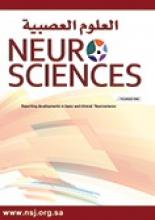Article Information
PubMed
Published By
Online ISSN
History
- Received February 25, 2018
- Accepted September 12, 2018
- Published online November 13, 2020.
Copyright & Usage
Copyright: © Neurosciences Neurosciences is an Open Access journal and articles published are distributed under the terms of the Creative Commons Attribution-NonCommercial License (CC BY-NC). Readers may copy, distribute, and display the work for non-commercial purposes with the proper citation of the original work.
Author Information
- Muhammad I. Naseer, M.phil, PhD,
- Mahmood Rasool, PhD,
- Angham A. Abdulkareem, PhD student,
- Randa I. Bassiouni, MD,
- Hussein Algahtani, MD, FRCPS,
- Adeel G. Chaudhary, PhD and
- Mohammad H. Al-Qahtani, PhD⇑
- From the Center of Excellence in Genomic Medicine Research (Naseer, Rasool Abdulkareem, Chaudhary, Al-Qahtan) King Abdulaziz University, and from King Abdulaziz Medical City (Algahtani), King Saud bin Abdulaziz University for Health Sciences, Jeddah, Kingdom of Saudi Arabia, and from Clinical Genetic Division of Human Genetics & Genome Research, National Research Center (Bassiouni), Dokki, Giza, Egypt
- Address correspondence and reprint requests to: Dr. Muhammad I. Naseer, Center of Excellence in Genomic Medicine Research, King Abdulaziz University, Jeddah, Kingdom of Saudi Arabia. E-mail: mimrannaseer{at}yahoo.com ORCID ID: orcid.org/0000-0002-9343-5825






